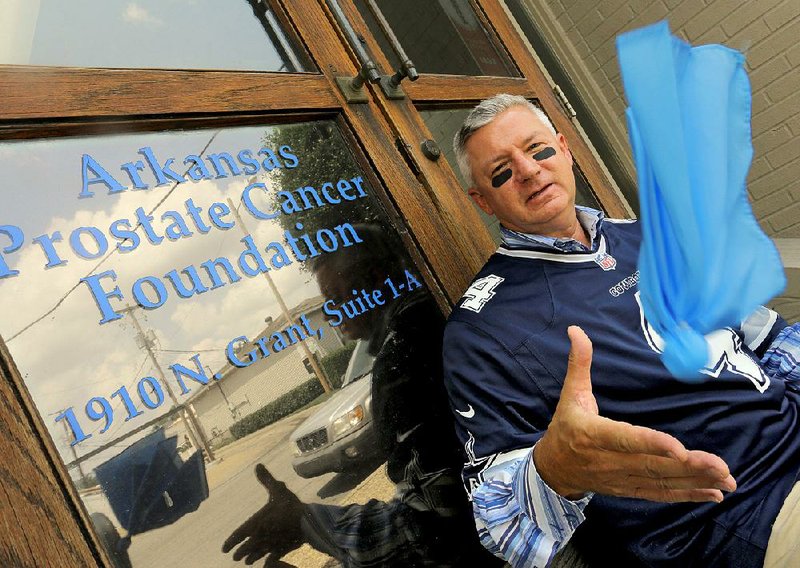Take heed, all you Arkansas high school and college football fanatics -- those blue ribbon stickers on players' helmets are a reminder to guys to get their prostate checked.
And when there's a penalty on the field and the referee throws a light blue flag -- that's a second signal.
It's all part of the Arkansas Prostate Cancer Foundation's Blue Ribbon Campaign, a well-orchestrated yet subtle strategy to get men (and their better halves) thinking about prostate cancer.
The cancer is not as easy to talk about as, say, that winning touchdown pass or game-tying field goal, but prostate cancer, when caught early, is easily cured.
John Findlay, an account executive for Comcast in Little Rock, doesn't like discussing prostate cancer any more than the next guy, but he doesn't mind sharing his thoughts on the importance of early detection. Findlay -- more so, his wife, April -- told a sold-out crowd at the foundation's Rockin' Blue Ribbon Bash in August that it pays to be diligent in testing. The couple were chairmen of the event held at the Annunciation Greek Orthodox Church in west Little Rock.
John Findlay, 54, was first diagnosed with prostate cancer at age 45. He had a recurrence five years later and then had a recent scare.
His first diagnosis came after his family physician, Dr. Keith Cooper, talked him into checking his blood for his PSA, or prostate-specific antigen, level. PSA is a protein produced exclusively by prostate cells. The chance of having prostate cancer goes up as a man's PSA level rises.
Findlay recalls telling Cooper, "Go ahead [and test for it]. I don't care. I'd rather do that than be dead." His number was "slightly elevated," and it was determined he had cancer. He had surgery to remove his prostate gland and the tissue around it -- just in time, Findlay discovered, as the cancer was starting to spread.
When he was about 50, his PSA level started to rise again, and he underwent radiation.
"If you have had cancer, I don't know if you're ever fully recovered," he says.
Doctors recently thought his cancer was back, but after some tests, they found nothing new and are back to monitoring his PSA level.
Although some men know vaguely about the PSA test and what it means, they seldom discuss it among themselves or with their doctors.
"Part of the problem with guys is that they don't want to talk about it," Findlay says. He includes himself in that statement.
But if Findlay had waited until the recommended age of 50 for testing, he might not have been around to see his son Noah graduate from high school or lived through the formative years of his younger son, Matthew.
"Just get tested," Findlay says. "That's all you've got to do."
That's where the Blue Ribbon Campaign comes in.
Bill Johnson, director of development and media relations for the foundation, gives credit to the foundation board for coming up with the idea for the campaign, which started with a small number of high schools in 2013. This year, Johnson sent scores of blue-ribbon stickers to the state's 200-plus high school teams, as well as a dozen or so colleges.
The foundation ordered 17,500 stickers for the 2017 season based on the number of players who participated on teams during the 2016 season. The decals are to be worn in September, which is national Prostate Cancer Awareness Month. The foundation hopes the teams will leave the stickers on for the duration of the season.
"Probably, once they're on, they'll stay on," Findlay says.
Along with the decals, the coaches received a public service announcement intended to be read over the stadiums' public address systems, explaining the purpose for the stickers. With the blessing of the Arkansas Activities Association, the blue referee flags were added this year.
"What we want people to do is just be aware of Prostate Cancer Awareness Month," Johnson says. "Our message is awareness. Our message is timely detection or screening. And our message is improvement of treatment options."
Among other things, the foundation provides an advocate for prostate cancer patients who can provide factual information so patients can make informed decisions about their treatment.
The campaign is supported by Arkansas Urology and is funded with a $20,000 grant.
More information on the Blue Ribbon Campaign for Prostate Cancer Awareness Month is available through Bill Johnson at bjohnson@arprostatecancer.org
High Profile on 09/03/2017

